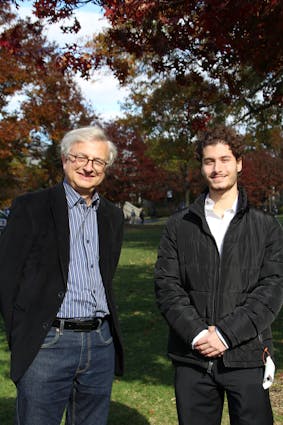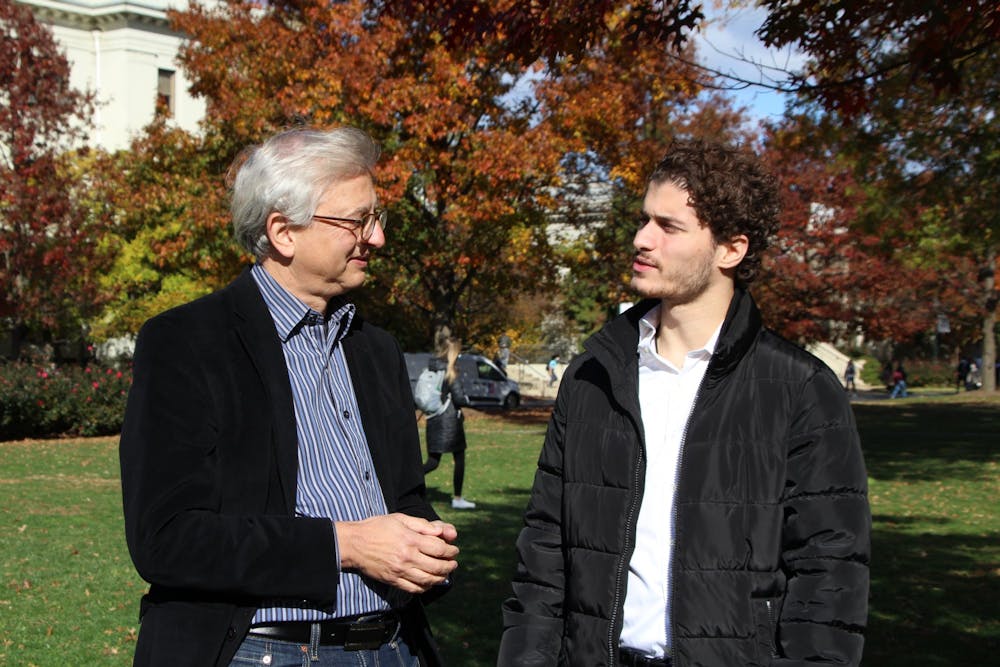For Yazan Nusiebeh, talking about Palestine has never been easy — until he met professor Michael Brenner.
Nusiebeh, a junior in the School of International Service, published an op-ed in The Eagle last May about American University’s Center for Israel Studies, calling for more Palestinian voices and a larger diversity in perspectives in the center.
Brenner, the director of the Center for Israel Studies, responded with another opinion article a few weeks after, sharing some of the center’s efforts to include more Palestinian voices.
The two finally met to talk in person in September, where they sat on a bench outside and shared experiences about their perspectives and how each came to be. After chatting about Israel and Palestine, the two found yet another difference between the two of them: soccer.
Brenner told Nusiebeh that he had to leave their conversation to attend an important matter: watching a European Soccer Champions League Game where Bayern Munich, Brenner’s favorite team, was playing FC Barcelona. Nusiebeh said he was a Barcelona fan, and the two of them went to watch the game together at local restaurant Chef Geoff’s.
“I always think that speaking to each other is the best way of building bridges,” Brenner said. “It’s really important for all of us to build bridges, especially on contested areas like the Middle East conflict, and I am very much aware we all have our own points of view. And we don’t have to blur on points of view, but we also want to learn from each other.”

Although Nusiebeh said he had previously attended some events at the Center for Israel Studies, it wasn’t until he published his article that he got to know Brenner.
Brenner also invited Nusiebeh to speak to his History of Israel class this fall. Brenner said that while he has invited Palestinian speakers to his classes before, this was the first time he has had a student come to speak.
Nusiebeh said that he enjoyed speaking to Brenner’s class, despite his initial reservations.
“At first it was kind of difficult because it was the first time I did anything like that,” Nusiebeh said. “But once you settle into the groove, you realize that you have something of worth to contribute with your perspective.”
Brenner said that while he disagrees with many of the points that Nusiebeh made in his op-ed, he has learned a lot from Nusiebeh.
“I’m also learning from his point of view. I always think if we respect each other, and don’t negate the existence of the other, that’s a precondition for every dialogue,” Brenner said. “And I hope we can continue to build bridges.”
Nusiebeh echoed the sentiment.
“Dr. Brenner has the kindness to be accepting of that perspective, even though we don’t necessarily agree on specific policy solutions around conflict,” Nusiebeh said. “He has a very, very open attitude towards conversation, different perspectives and stuff, so it was so appreciated.”
For both Brenner and Nusiebeh, it’s not about trying to change the other’s mind, but using their differences to better understand each other.
“In my talks with Dr. Brenner, I’ve never backed down from my beliefs on Palestine,” Nusiebeh said. “I’ve always believed the same things and I will always believe that what I believe is just, no matter who tells me that.
“But just having the understanding about what motivates the other side, helps you one, have empathy for them, and two, helps you understand them. There’s always benefits to reaching out to the other side.”
Brenner said that although this is the first time he has received criticism like this from a student, he emphasized that the CIS tries to bring in Palestinian perspectives whenever possible, while still keeping in mind its initial goals.
Nusiebeh said there will always be benefits from seeking out conversations with people you disagree with, and encouraged people to start dialogues with those they may disagree with.
“If you have an issue, or you’re feeling some type of way, or if you’re feeling neglected by anything, bring it up because there are probably people who feel the same way. And there’s probably people on the other side who want to help in any way they can, even if they don’t know how to help exactly, that communication with you and them lets them know what’s the best way to help too,” he said. “Even if you don’t agree with someone, you can ask them their reasoning behind believing the way they do — you will help understand them.”





